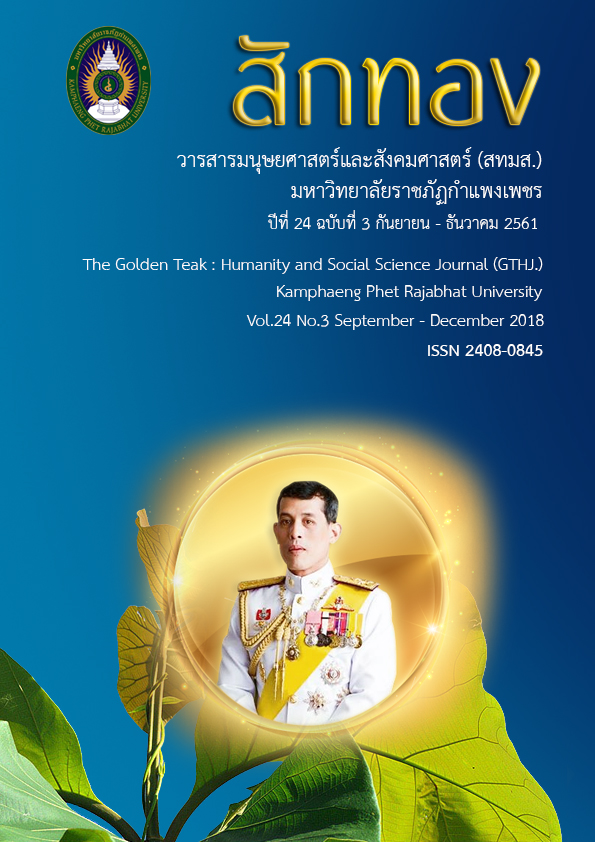A Study Actuality and Expectations and Changing trends of Kamphaeng Phet Rajabhat University
Main Article Content
Abstract
The purpose of this research is to study the current conditions and future prospects analyzed to the changing trend of Kamphaeng Phet Rajabhat University which expected to occur in 2018-2022. The research method is divided into 2 steps according to purpose. The data were collected through questionnaires and in-depth interviews, by analyzing the data to see an average, standard deviation, and content analysis. The research found that the current state of the organization structure is vertical. The university council is the policy maker, but there is a problem in conveying the practice. However, the overall mission management was effective and it worked as an integrated academic network. There were comments expressing disbelief in the system and the mechanism for recruiting executives, and important expectations include decentralization. For this case, it drove the organizations to the world strategic quality measurement of graduates from entrepreneurs by creating research supporting the provincial policy, applying sufficiency economy philosophy to community development and corporate governance, including associating with world heritage sites across-faculty production and building academic networks across campus. The changing trend was to restructure the organization in line with the Thai 4.0 policy by increasing decentralization and amending the regulations or the process of recruiting executives for fairness. Policy and strategy were more about location and community, using faculty as a mechanism to work with cross-faculty work while the teaching was integrated with the work to create Thai features for students. Innovation and value were added as a world heritage city for community development. The oriented development viewed as an electronic university with emphasis on interactions between personnel and built a reputation for acceptance.
Article Details
บทความที่ได้รับการตีพิมพ์เป็นลิขสิทธิ์ของวารสาร สักทอง : วารสารมนุษยศาสตร์และสังคมศาสตร์ สถาบันวิจัยและพัฒนา มหาวิทยาลับราชภัฏกำแพงเพชร
ข้อคิดเห็นใดๆ ที่ปรากฎในวารสารเป็นวรรณกรรมของผู้เขียนโดยเฉพาะ ซึ่งมหาวิทยาลัยราชภัฏกำแพงเพชรและบรรณาธิการไม่จำเป็นต้องเห็นด้วย
References
Chaiworakul, S. (2015). University Train. [Online]. Available : template.rmutto.ac.th/senate/wp-content/uploads/.../UniversityTrain.pd. [2016, December 2].
Chareonwongsak, K. (2012). Compare Harvard class : Dare Thai higher education, think far, go to. Bangkok : Success.
Committee on Assessment and Conclusions of the President of the University Council of Thailand 2009. (2009). Quality of Thai higher education?. [Online]. Available : http://www.senate.mahidol.ac.th /Newsletter/PDF-News/2552/5210.pdf. [2016, July 20].
Cooparat, P. (2015). Reform in Higher Education in Documents for lecture on May 20, 2015 (unpaged). Bangkok : Faculty of Social Sciences and Humanities, Mahidol University, Salaya.
Kamphaeng Phet Rajabhat University. (2016). Strategic Plan 2013-2060 (updated 2015). To convey to the government plan for fiscal year 2016-2560. Kamphaeng Phet : Kamphaeng Phet Rajabhat University.
Lathapipat. D. (2016, July 12). The World Bank provides information that Thai graduates have more but lower quality in Dailynews. [Online]. Available : http://www.dailynews.co.th/education/508639. [2016, July 14].
Ministry of Education. (2015, August 31). 15 Year development plan : Overhaul. [Online]. Available : http://www.moe.go.th/moe/th/news/detail. php?NewsID=42718&Key=honews. [2016, July 6].
Office of the Education Council. (2016a). Education reform for the future of Thailand (Stable-Sustainable-Wealth) Education Policy of the Prime Minister
(GeneralPrayut Chan-o-cha). (2 nd ed.). Bangkok : Office of the Education Council.
_______. (2016b). (draft) The National Education Plan 2000-2025 (Updated) April 1, 2016). Bangkok : Office of the Education Council.
Office of the Minister. (2015). Brainstorming on the problem of good governance in higher education institutions. [Online]. Available : http://www.moe.go.th/websm/2015/ nov/385.html. [2016, July 11].
Ousawat, C. (2011). Social expectations of roles and Responsibility of the Council of Higher Education. [Online]. Available : http://www.mua.go.th/users/bhes/ front_home/Ohec_bhes2554/Doc_54/p8_13.00-14.45/8_02.pdf. [2016, July 10].
Panich, V. (2010). Change the paradigm of Thai Higher Education. Bangkok : Plan Printing.
_______. (2012). The article's Vicharn Panich : the quality of Higher Education. [Online]. Available : http://www.thaiihdc.org/web/index.php?option=com_content&view=article &id=181:2555-10-13-13-43-11&catid=14:2557-06-25-06-53-40&Itemid=23. [2016, July 6].
Poovarawa, Y. (2014). Challenges of New Frontier in Learning : Education 4.0) in Challenges of New Frontier in Learning : Education 4.0 November 12, 2014 (pp. 6-13). Bangkok : Center for Innovative Learning Chulalongkorn University.
Ratanasuwan, D. (2015, December). The cooperation of Thai higher education in solving the problems of the country. OHEC Newsletter [Online Serial], 7(303). Available : http://www.mua.go.th/pr_web/ohecnewsletter/data/303.pdf. [2016, July 15].
Ruchuphan, M., et al. (2011). Discussion on the New Approach to Higher Education Institutions at the National Conference on December 14, 2010. [Online]. Available: www.rajabhatnetwork.com/upload/images/.../New-higher-education.doc. [2016, July 6].
Schwab, K. (2015). The Global Competitiveness Report 2014–2015. Geneva Switzerland : World Economic Forum.
Somboon, T. (n.d.). Thai Higher Education : Nobility or Intellectuality Building. [Online]. Available : http://www.edu.ru.ac.th/images/edu_files/Thai_Higher_Education.pdf. [2016, July 4].
Thirawanutpong, P. & Bunpro, P. (2018, January-June). The Development of Lecturer’s Potential in higher education institutions. Skru academic journal, 8(1), 33-40.
Wasi, P. (2014). University Reform. Bangkok : Folk Doctor Foundation.


